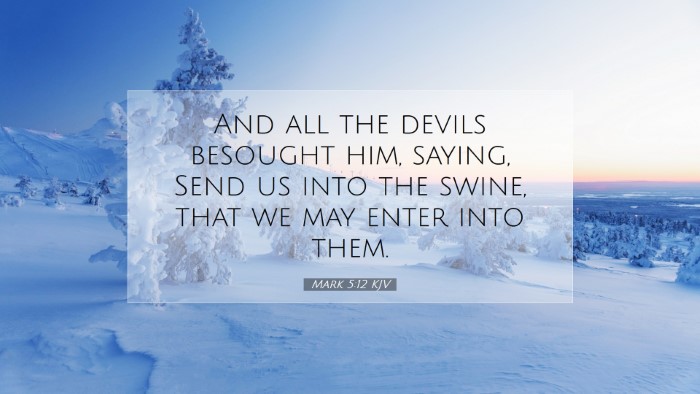Commentary on Mark 5:12
Mark 5:12 states, "And all the devils besought him, saying, Send us into the swine, that we may enter into them." This pivotal moment in the Gospel of Mark illustrates the authority of Jesus over demonic forces and the unusual interaction between spiritual beings and earthly creatures.
Contextual Overview
This passage occurs in the narrative of the Gerasene demoniac, where Jesus encounters a man possessed by a multitude of demons. The demons' request to enter the swine indicates not only their awareness of Jesus’ authority but also their desire for a physical embodiment.
Insights from Matthew Henry
Matthew Henry highlights that the demons recognized Jesus and exhibited a desperate need to avoid the abyss. His commentary reflects on the significant relationship between spiritual and physical realms, noting:
- Recognition of Authority: The demons acknowledged Jesus’ power, understanding that their fate was in His hands.
- Desperation: Their plea to enter the swine signifies their fear of being cast out without a physical host.
Henry concludes that this event demonstrates the mercy of Jesus, as He allows the demons to enter the swine rather than banishing them entirely, thus revealing the complexities of grace and judgment.
Insights from Albert Barnes
Albert Barnes provides a detailed exposition that emphasizes the nature of evil spirits and their plea. He notes:
- Nature of Demons: Barnes emphasizes that the request illustrates the persistence of evil spirits and their need for a habitat, which leads to their choice of entering the swine.
- Divine Permission: He observes that Jesus granted their request, suggesting that God often allows evil its temporary reign for His purposes.
- Consequences of Evil: The resultant destruction of the swine serves as a poignant reminder of the destructive nature of sin and demonic influence.
Barnes articulates that the passage compels believers to understand the consequential nature of choice, both for the possessed and the unaffected.
Insights from Adam Clarke
Adam Clarke’s commentary provides a linguistic and cultural perspective, offering insights into the socio-religious implications of the swine being unclean animals in Jewish law. He remarks:
- Cultural Context: Clarke notes that the presence of swine in a Jewish vicinity raises questions about the locale and practices of the people surrounding the Gentile territory.
- Symbolism: The swine’s destruction symbolizes the futility of both evil and idolatry, as those who indulge in that which is detestable (like swine) soon face judgment.
Clarke elaborates that the event serves also as a transition to demonstrate Jesus’ mission to Gentiles, challenging the Jewish exclusivity, thus broadening the Gospel's reach.
Theological Implications
The passage leaves an indelible mark on Christian thought regarding the nature of evil, the authority of Christ, and His compassion for those suffering under spiritual bondage. Key themes include:
- The Authority of Christ: The narrative asserts that Jesus wields power over the demonic realm, reinforcing His Divine nature.
- The Reality of Spiritual Warfare: Believers are reminded of the ongoing battle against spiritual forces and the need for vigilance.
- Redemptive Possibilities: It signifies hope for those tormented by evil; Jesus seeks to redeem rather than condemn, emphasizing His merciful character.
Conclusion
Mark 5:12 encapsulates crucial aspects of Christ's ministry and authority over evil. The insights gathered from Henry, Barnes, and Clarke underscore the complexity of the narrative—an encounter that bridges human suffering, divine authority, and the darker realms of existence. For pastors, students, theologians, and scholars, this verse invites deep reflection on the implications of Jesus' power to liberate and the continuing relevance of spiritual battles in contemporary faith life.


